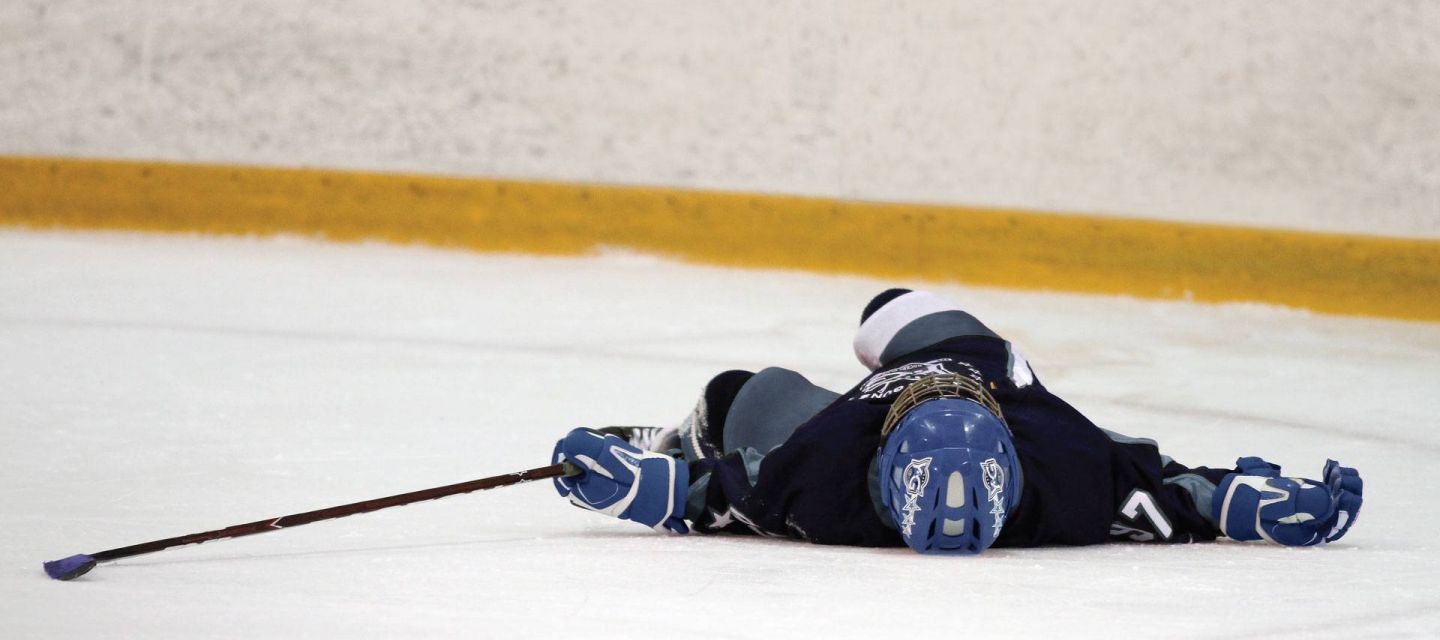Imagine a sports helmet that can better absorb the shock of a hit. It would make contact sports like hockey and football much safer. UBC Okanagan (UBC-O) researchers are working toward doing just that by teaming up with the makers of a revolutionary shock-absorbing material to develop a helmet liner that will reduce the likelihood of head blows damaging players’ brains.
But concussion research at UBC isn’t limited to a distant technology. The risks players face on the field are being mitigated by an app that alerts coaches and trainers when an athlete’s head health has been compromised — and prevents the athlete from returning to the game if the risk of greater damage is too significant.
UBC researchers are finding real-world solutions that let athletic performance, not injury, be what athletes focus on when they’re playing.
DID YOU KNOW?
Football is the most common sport with concussion risk for males (75 per cent chance for concussion)*
When former NFL player Dave Duerson fatally shot himself in the chest in 2011, he left a note asking researchers to examine his brain. He knew without a doubt that his mental functioning had been compromised by all his years playing football.
Sure enough, medical examiners found in Duerson’s brain evidence of chronic traumatic encephalopathy (CTE) — brain damage thought to be linked to repeated impacts. Not surprising in a game where players ram each other primarily with their heads, each time exerting forces upwards of 20 G, or the equivalent of driving a car into a brick wall at 55km/h. And they do it 10, 20, 30 times a day. Heading a ball in soccer? That’s a jaw-dropping 112 km/h on impact. The math is sobering.
Duerson is just one of a number of athletes from a variety of contact sports who have suffered life-altering damage to their brains as a result of CTE. Concussion awareness has exploded in recent years due to stories such as Duerson’s and other athletes who have come forward to acknowledge that repeated blows to the head have changed their brains and affected their personalities and identities in profound ways.
With a suicide rate that’s four times higher for multiple-concussion sufferers versus non-concussed individuals, it’s no wonder that parents, coaches and athletes are growing increasingly concerned about the risks that contact sports pose to brain health.
As a coach and an athlete herself, Kerry Costello, an MBA grad from UBC Sauder’s Robert H. Lee Graduate School, recognized a need for better brain health management to help ensure athletes don’t play beyond what their brains can handle. Costello teamed up with kinesiology PhD candidate Harrison Brown, who specializes in human motor behaviour and concussion research, to develop HeadCheck, a mobile app and headband that accurately and instantly measures concussion risk. Coaches can use it on the sidelines and know within minutes whether to let a player return to the game or pursue medical treatment.
HeadCheck outperforms the three-page paper diagnostic test that is the current gold standard for concussion diagnosis. The app digitizes data, making it more accessible to doctors and trainers. It assesses symptoms and cognition, and uses an algorithm to measure balance. When the HeadCheck results screen shows variances, it becomes clear to trainers, coaches and athletes that returning to play will jeopardize brain health even further.
Currently, HeadCheck is receiving excellent reviews by UBC and University of the Fraser Valley sports teams, as well as by the Edmonton Oil Kings and the Victoria Royals. Costello, Brown and fellow company co-founder UBC alumnus Alexey Manov are currently examining HeadCheck’s applicability in other areas where concussion is a problem, such as the military and in hospital emergency rooms.
While HeadCheck’s focus on minimizing concussion risk is helping players in real time, another UBC-led group is working on technologies that will greatly limit the vulnerability of the brain in sports where head injury can sideline an athlete or worse. UBC-O Professor Paul van Donkelaar has teamed up with the UK-based makers of Armourgel and Kelowna’s Helios Global Technologies to develop a helmet liner that could significantly lessen the impact of blows to the head.
Van Donkelaar, whose research focuses in part on how concussions affect blood flow to the brain and impair cognitive function, believes Armourgel holds tremendous promise for athlete health: “Finding ways to improve the safety of contact sports is one key approach to mitigating the risks of concussion. The development of Armourgel helmets could be a step in the right direction to making contact sports safer.”
It’s a revolutionary technology that holds the potential to help reduce the risk of concussion and protect healthy brains from devastating damage. Lightweight and flexible, yet able to effectively block incredible forces, Armourgel holds promise that players won’t be risking their lives when they step out on the field.
For those who are trained to take — and deliver — heavy blows, these UBC technologies will help players stay competitive and know they’re safer sprinting to an all-star touchdown.
